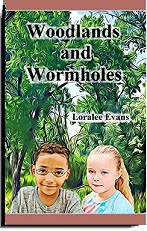Mike Thayer is a master at creating a unique and completely believable world; one that is separate but parallel to our own. And I might add, close enough that the main character is actually able to communicate on occasion, (when he can find enough bars) with the Earth side of the dimensional divide.
 |
| Passage to Avalon (c) 2018 by Mike Thayer |
What actually happens when he finally comes into contact with his missing friend was something I predicted would happen, but it was still very exciting, since the protagonist and his friends had not anticipated it.
For myself, and taking into account that I am not a member of the target audience, I really did not like Samwise. He is a downright cruel boy who plays mean tricks on people, thinking himself clever and witty as he does so, and calling the mean tricks "pranks" to justify them. I do understand the appeal of such books to many middle grade readers, however, and were I a younger person and a member of the target audience of this book, what Samwise did wouldn't have bothered me.
I hoped Sam would grow as the book moved along, but from what I saw of him, he largely didn't. As the story neared the end of the book, he even said that the "pranks" he played were only done to people who "deserved" it. I wondered what the librarian at his school had done to him that was so terrible that she deserved to have her lunch ruined which is a difficult thing at best, and at worst could be outright dangerous if she has health issues and needs to eat regularly. (I mention this because I have witnessed first hand "pranks" being pulled on a teacher almost just like this, and the teacher spent the next day sick at home, and unable to keep anything down.) I also wonder what the vice-principal did that was so horrible that Sam believed that it was appropriate to risk causing serious eye damage to the man. Had the egg Sam dropped hit the vice-principal in the eye rather than the forehead, it could have seriously injured his eye or even blinded him, and Sam was old enough to know that. What he was doing right before the earthquake wasn't much different than chucking a frozen turkey off an overpass. Being young does not excuse him from being unkind or ignorant to such potential problems. He's not five years old; he's fourteen and at this point in his life, he has the ability to know better. If he doesn't know better, it's because he has consciously chosen not to learn better. He mentioned, also toward the end of the book, that pulling his so called "pranks" was something his dad (who is deceased when the story begins) had taught him to do. I was a bit surprised at this. If his dad would approve of and participate in such meanness, then alive or dead, he's not a great guy. But would his dad really approve of Sam treating people in such a cruel way and think it funny? I seriously doubt it; most likely, the mean pranks Sam has pulled on teachers, police, and likely others is more a misguided interpretation of harmless and playful jokes his dad taught him that would entertain everyone, not just the person doing the prank.
In addition, again near the end of the book, Sam still hasn't learned much about honor or honesty and shows it when he lies to one of the characters who asks him if anyone could learn to use his phone; he leads the person to understand that he, Sam, is the only one who can or ever could use the phone the way he does. The person who asked hadn't given any indication of being a bad or dishonorable person, and Sam had no reason to withhold the truth from the person. The only reason he did it, is because he wanted others to see him as special, as the only one with the ability to control his phone and all the things it could do.
From his attitude, it appears that at the end of this first book he still hasn't learned a significant amount of character. It will be disappointing if, at the end of the series, he still sees half-truths as acceptable, or teachers as dross, and as suitable brunts of cruel jokes like he does at the beginning.
That being said, much of his acting out in such mean ways may have something to do with the fact that his dad passed away before the story began. Sam does try to rescue his friend, and even endures difficult and dangerous situations in his attempt to find and save the other boy. It will be interesting to see if he learns to extend that compassion to others including his mom and other adults (teachers, the police and other authority figures) in our dimension (not just the cool cowboys and rebel leaders in Avalon's dimension) and if he learns to appreciate the often raw endurance that such adults exercise when dealing with a child like him and what they all do and go through for him by the end of the series.
Of course, this is just the first book of a series, and the following books may see Sam learn and grow in surprising ways. The world building, as I already mentioned, was absolutely astounding, and Avalon, with its environment, people, magic system and rules, and the deliciously corrupt government is completely riveting.
Middle grade readers will find this book engaging and exciting, and will look forward with much anticipation to the rest of the series!




















